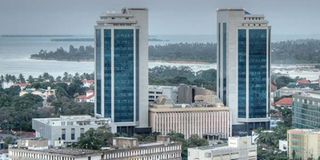Only 32pc of donor funds released in five months

What you need to know:
The Bank of Tanzania’s economic review for December shows that grants, development project loans and non-concessional borrowing were far below the pledges in the current financial year
Dar es Salaam. The government could find it difficult to finance this year’s budget amid concerns over the increasing unpredictability of foreign sources.
The Bank of Tanzania’s Monthly Economic Review for December shows that grants, development project loans and non-concessional borrowing were far below the pledges in the current financial year.
Between July and November 2016, the three sources of revenues for budget financing performed dismally.
For instance, Tanzania received only 32 per cent of the grant aid that was planned for disbursement between July and November 2015.
The country received only Sh328.8 billion out of the Sh1.01 trillion in grants that was meant to be released between July and November, 2016. Likewise, it was a mere 18.2 per cent of the planned foreign non-concessional loans that was delivered during the period while, of the Sh1.7 trillion that was sought to be collected from foreign sources in form of development project loans, Tanzania managed to get only Sh441.48 billion during the period, according to BoT figures.
Basically, that type of financing is channelled to the development expenditure. In November alone, the government was supposed to collect grants to the tune of Sh235.3 billion, but received only Sh15.12 billion only.
The trend is said to probably be influenced by the state of the economy as implementation of development projects has slowed down.
“The main reason for this might be a problem with our implementation capacity of the development projects. There is a slowdown in these projects and that way the country cannot justify the finances from the development partners,” said Prof Delphin Rwegasira from the University of Dar es Salaam’s Economics Department.
“We should not also forget the traditional behaviour of the donors to attach conditionality and delaying tactics which have impact in the financing,” he told The Citizen by phone.
Prof Rwegasira added that unpredictability of the government policy towards the private sector is causing uncertainty which also affects the non-concessional borrowing.
“So, the Magufuli effect which influenced the change of the economic situation through his tightening policy, has contributed to such trends as slowing down of the project implementation. It’s not bad, anyway. This is just transitional and things will come back to normal,” said Prof Rwegasira.
Tanzania approved a budget of Sh29.5 trillion for 2016/17 including the Sh11.8 trillion estimated for development expenditure.
A total of Sh3.1 trillion of the development expenditure is supposed to come from foreign sources.
However, the BoT report indicates that up to the end of November, only Sh699.78 billion of the foreign development financing was received. The target was to get Sh2.7 trillion during the first five months of the current Budget which started last July.
In November alone, the government budgeted to spend Sh653.5 billion as development expenditure financed by foreign sources but it received Sh157 billion only.
The locally financed development expenditure was actually at Sh445.1 billion compared to the estimated Sh596.4 billion in the same month.
During the month, the government realized domestic revenue amounting to Sh1.3 trillion which was 90.3 per cent of the target for the month.
This is happening as the economy is experiencing a shrink in the growth of the credit to the private sector.
Credit extended to private sector by banks increased by Sh1.4 trillion to Sh16.6 trillion during the year ending November 2016, representing an annual growth of 9.4 per cent. However, in the corresponding period in 2015, there was an increase of Sh2.99 trillion, equivalent to an annual growth of 24.5 per cent.
The slowdown in credit growth was recorded in major economic activities with the exception of personal loans.
More concern was in agriculture, manufacturing, hotel and restaurants as well as transport and communication activities which all recorded negative growth.
Early last month, the Finance and Planning minister Dr Philip Mpango was quoted by the media as saying the government was in serious negotiation with lending financial institutions to borrow funds for the current national budget. He said the talks were held with the African Development Bank (AfDB), World Bank, the European Union, Kuwait, Abu Dhabi and the Organisation of Petroleum Exporting countries (Opec).
He said the high costs of borrowing, tough loan conditions set by lenders and donors were some of the challenges faced by the government as it tried to get funds for the first five month of implementing its 2016/17 budget.
Until yesterday, reports showed that the World Bank has agreed to give Tanzania a $305 million loan to expand the port of Dar es Salaam.
The loan is part of a $785 million loan from the Bank that the Tanzanian government is seeking to execute development projects in the east African economy.




